all of the selves we Have ever been
 I am feeling weepy today. Serena Williams will take the court at the Arthur Ashe stadium this evening. It is possible that this will be the last time she participates in the U.S. Open or any professional tennis match. Though she dislikes the word “retire,” Serena told Vogue magazine that she is “evolving away from tennis” to grow her family and her business interests. Just shy of her 41st birthday, Serena is a 23-time grand-slam champion. Even though I don’t know much about tennis, I do know that is a remarkable record. And while I have no money on the game, I am rooting for Serena to come out on top at the Open. I want to see her go out in glory. I was in high school in 1973 when Billy Jean King took on Bobby Riggs in the Battle of the Sexes. It seems ridiculous today that that tennis match was such a big deal, but women’s sports and women, in general, took a back seat to men. It was not long after Billy Jean King won that match that I graduated from high school and went to work in an office. What we would call sexual discrimination today was the order of business back then. I remember young women law clerks being told that a woman would never sit in the board room or new female associates being told that if they were thinking of having children, they could kiss their careers with the firm goodbye. Young women of that era worried constantly about their weight as they squeezed themselves into short skirts and high heels, served the coffee, picked up the boss’s dry cleaning, and typed the boss’s kid’s term papers. Women made little money because it was considered pin money: “Buy yourself a nice dress,” money. Leave the real earning power to men. We did what we had to do, and thankfully, we tossed an evolving, improving world to the next generation. Serena caught the ball and hit it farther than any woman of my generation, white or black, could have imagined. She is beautiful and powerful in a way that the ancient Greeks and Romans would have memorialized in statues. Her spirit is indefatigable, and she is a force that transcends envy. One can only feel awe. So, I am cheering for Serena today. Do it for yourself, Serena. Do it for all of us. And do it in the Arthur Ashe Stadium, the namesake of another tennis great who dared to pick up a racket in 1949 and changed the rules of the game. The wheels turn slowly. Some of us push, others drive, and then there are the exceptions, the few who fly. Many of us fought the good fight. We are coming to the finish of the race. You help us to keep the faith, Serena. Show ‘em how it’s done.
0 Comments
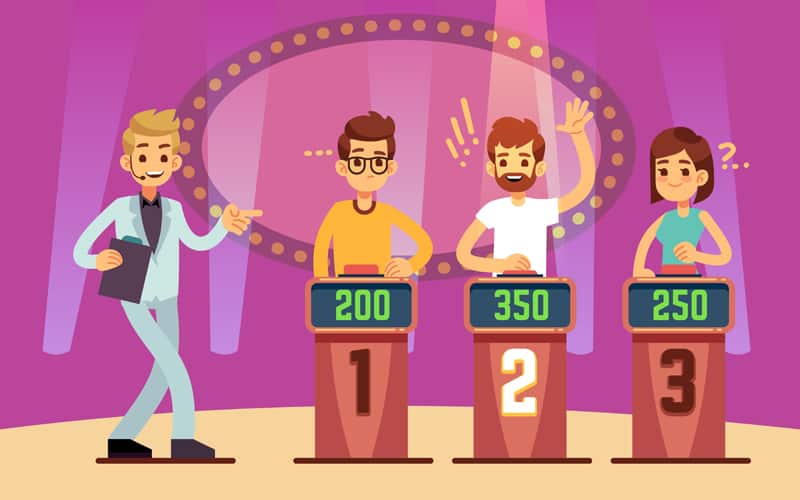 Welcome to America’s hottest new game show: What About the Other Guy?--the audience-participation game in which powerful people are confronted about their behavior. The point of the game is to see who is best at evading responsibility for his actions by shifting attention to someone else. The contestant’s role is to maintain his stance as victim while responding with vague and impressionistic speech that deflects all responsibility for his actions. The contestant then asks: “What about the other guy?” and begins naming names. Prior to the start of the show, audience members record their guesses of who the contestant will attempt to humiliate in this word version of grade school dodge ball. The audience’s answers are compared with the accusations of the contestant, and the correct audience members go home with bragging rights and a moral vacuum. Contestants for the show are selected from a large pool of politicians, CEOs, and powerful wannabes who enjoy the spotlight. When the buzzer sounds at the end of the game, the person who has knocked out and humiliated all of the other guys wins a leadership position in the corporation or branch of government of his choosing where he can raise endless amounts of cash and create maximum pandemonium while building a celebrity brand. The winner is sure to become America’s favorite advisor on everything from space travel to socks, and he receives the additional psychological benefit of unleashing every bit of anger and venom he has nursed throughout his life along with the opportunity to seek pardons for crimes previously committed but not yet publicly revealed. The top ten winners return for the Tournament of Champions, an extreme contest in which the participants compete to see who can bring an end to democracy in the shortest amount of time without breaking a sweat. The winner of that contest earns the title of King, his own social media platform, a television series in which he gets to play God, and a trip to outer space inside a giant penis-shaped rocket. Interested in becoming a contestant? Please answer the following screening questions: 1. Is there anyone smarter than you? 2. Have you ever been wrong? 3. Does a sworn oath mean anything to you? 4. Have you ever been accused of decency? If you answered “yes” to any of the questions, you are not eligible to participate at this time, but keep trying. We love a contestant who never gives up. In the meantime, follow us on our social media platform: What About where we will never share your data. But if it does get out, don't call us; it was probably that other guy. 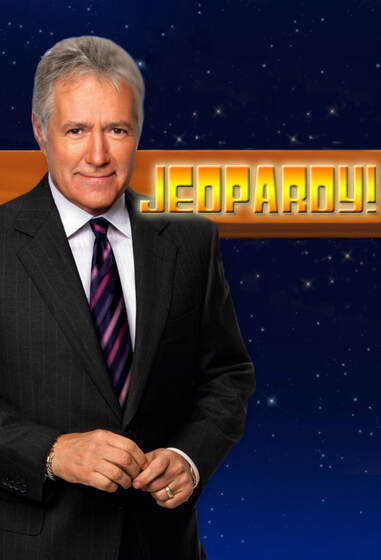 In a year in which we have felt that everything we hold dear is in jeopardy, a final blow—we lost the man with all of the answers. Jeopardy! has been on the air since 1964 beginning as a daytime television show, but those first twenty years were just a warm-up for the real headliner, Alex Trebek, who stepped onto the set in 1984. Folks like Khloe Kardashian, Mark Zuckerberg, LeBron James, Mandy Moore, and Lindsey Vonn who were born in 1984 spent their entire lives with Alex Trebek. He was Jeopardy! Several generations have grown up or grown old with him in their living rooms each evening. Jeopardy! is the game that brought us all together. It was a TV trivial pursuit, but it didn’t feel trivial. We played along with those Jeopardy! contestants feeling scholarly and wise. Young and old, we shouted out answers. I knew my children were grown up when they became the ones with the correct responses. Unlike so many other contests in life, there were no losers on Jeopardy! It was an honor to play the game. To be chosen as a contestant elevated a person to the category of intellectual. For those of us playing from home, a single correct response gave us hope, elevating our own self-esteem. For those thirty minutes each evening, we experienced the power of engaged minds. There was nothing else in the universe. No worrying. No arguing. No ruminating. We played the game. This week, I have come to an aching acceptance of an empty chair in my living room. The game will go on, but there will always be someone missing. There will be dinner each evening, but no dessert. There was the game, and then there was Alex Trebek. He was handsome and recognizable at age 50 and still at age 80. Alex was a star in his own right, but not tabloid fodder. He was low key and projected a world that was better than we thought it could be. The most shocking thing he ever did was shave his mustache. He was not one to be outrageous for the purpose of seeking attention, but he was known for his sharp wit—even his humor was intelligent. He was a good sport and made an occasional appearance on Saturday Night Live and once traded places with Wheel of Fortune Host Pat Sajak as an April Fools Day joke. His gentle life was a lesson though he did not preach. We felt the lesson just as much as we could see it. He emanated decency and old-fashioned manners. Alex Trebek was smart, articulate, steady, graceful, and gracious. His presence was comforting and reassuring. A stickler for the rules, he was not a judge. If the clue was “Salt of the earth,” the correct response would be: “Who is Alex Trebek.” In spite of the popular advice to “find your passion,” we saw a man who had found his niche. He seemed to understand that life’s answers often come in the form of a question. Equipped with knowledge, a person can ask the right questions. As Jeopardy’s Executive Producer Mike Richards recently stated, Alex Trebek “made being smart cool.” A Holocaust survivor once told me that he looked forward to heaven because “that’s where all the answers will be.” I smile now as I recall those words that this week became a prophecy. Heaven is where all the answers will be. Alex Trebek will be our host. “I’ll take ‘Enlightenment’ for a $1,000, Alex.” 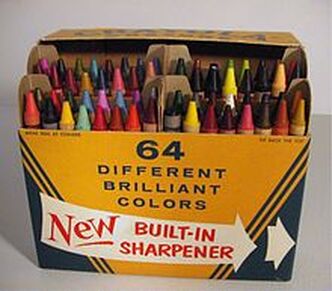 This pandemic is getting long. There are days when I feel like my eight-year-old-self. Stuck in the middle of a long, hot summer with all of my friends on vacation, I would throw myself across the couch like a worn afghan, legs dangling like loose threads, and whine, “There’s nooooooothing to do!” Sometimes my siblings joined me in a chorus of that late summer song, but a busy parent didn’t care much for the number and warned, “Find something to do, or I’ll find you something to do.” My brother, sisters and I were bored, not stupid. We intuitively understood that whatever our mom or dad had in mind would be sure to take us from the purgatory of boredom straight into the fires of chore hell. We took our whining elsewhere. Sometimes we scattered and found solitary activities, other times we found things to do together. Staples of play that could be done alone or together were cutting out paper dolls, playing jacks, shooting marbles, and reorganizing collections of baseball cards, but the most reliable go-to was coloring. It would be a dull world without Crayola crayons. There is nothing like a little spring green or magenta to rub away the dreariness of a summer grown too long. Those waxy instruments taught children their colors and grew eye-hand coordination. They provided the life lesson and discipline of learning to stay within the lines. Coloring was therapy we didn’t know we needed--relaxing, shielding the mind from dread and worry. We occupied ourselves by creating art. As we got older and more sophisticated, we learned to outline in black or to mix colors. All children coveted the 64-pack with the built-in sharpener. All those colors! And the fresh tips standing straight up like soldiers in progressively raised rows! We longed for that flip-top box the way kids today crave a new iPhone. A fresh 64-pack put a youth in league with the Renaissance masters. A child could color alone or with others. Tear out pages or sit side-by-side. Rank and ownership were reflected in who maintained control of the coloring book. We poured over each page looking for the “good” one—an image we liked or could imagine complete with just the right colors. And the 64-pack made us aware of a growing palette of colors: burnt orange, lemon yellow, forest green, cornflower, periwinkle… I am happy to see that coloring has returned in adult form. I still have a box of Crayola crayons leftover from my children’s early elementary school days. It is only the 48-pack. No sharpener. I notice that after all of the years that have passed, there are still several crayons with pointed tips standing at attention underneath the flip-top lid. Melon, blue green, lavender, and sky blue did not get much of a work out. I will have to make that right… I read somewhere that inventor Thomas Edison’s laboratory burned to the ground in 1914. Edison was quoted as saying, “I’ve been through a lot of things like this. It prevents a man from being afflicted with ennui.” Now there’s a man who could not tolerate boredom! I am surprised that he is not the one who invented crayons. What would Edison be up to in a pandemic? It is not likely that we would find him stretched across the couch whining about nothing to do. I’m no Edison, but I am a grown up now. I am not bored; I am experiencing ennui. Coloring is fashionable again. I am busting out the crayons and throwing out the matches. I have something to do! 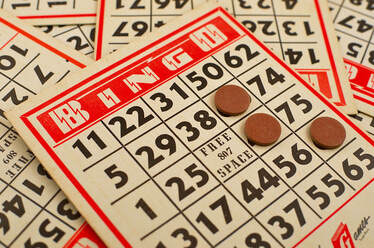 Life is a numbers game. I learned that in the church basement when I was seven. I am not certain where it ranks in the catechism of the Catholic Church, but somewhere among Baptism, Penance, Eucharist, Confirmation, Holy Orders, Anointing of the Sick, and Matrimony, there is also BINGO. At least it seemed so in my youth. The church basement was reserved for special functions, chief among them were funeral meals and BINGO. There was always a good turnout for mass or a funeral meal, but BINGO drew the biggest crowds. Sure there were some raised eyebrows if someone MIA for mass was later spotted at BINGO, but no hard feelings. Play on. The participants were the usual church crowd but in casual clothes. There were no stiff jackets and ties. No tight shoes, hats, chapel caps, or veils. No expressions of piety. Everyone was loosened up. Game faces on. Sinners mingled with saints. Protestants and non-believers came too. In the Lord’s game, everyone was welcomed at the BINGO table. It seemed to me the entire town was present. Like Brother Love’s traveling salvation show, it was “pack up the babies and grab the old ladies” ‘cause everyone goes…If foreign vandals had wanted a big haul, all they had to do was check the church bulletin for the BINGO schedule. No one was home, and every door in town was unlocked. With all of the adults in the church basement, there was no one to watch the children, so we got to go too. That meant staying up late, a much-prized accomplishment of youth, a sip of adulthood like trying on lipstick or tasting dad’s beer. In the context of the times, men ran the show, usually Knights of Columbus. They had no sparkling armor but wore soft cotton aprons with pockets full of change and tiny pencils. Women ran the food stands and DOMINATED the sport. It was women who filled the tables to play. It was rare to find a woman with only three cards. That was the minimum and the sure sign of a beginner. Many of the Olympians watched over three or four long rows of cards. The room was filled with lively chatter and tobacco smoke. No one worried about lung cancer when she was busy looking for B-9. It was an evening of contagious joyful anticipation. Even losing was not so bad. It was how you played the game. Observing the players, it would be impossible to believe that BINGO is a game of chance. Among the seasoned, there were strategy and rituals. Folks had to have their lucky seats. Same people, same seats week after week. It was easier to find someone in the BINGO hall than in the telephone book. They positioned their paper coffee cups and enjoyed their lucky snacks at the propitious time. People looked for cards with their special numbers. They brought their own equipment including disc markers, wood and later, plastic, and ink daubers, the true mark of a professional. While I had a sweet prayer book with a picture of Jesus on the cover, and a rosary with tiny white beads, the prized possessions of a second grader, what I really coveted was the womanly red BINGO blotter. It put me and my stubby, dull-tipped, yellow pencil to shame. I did not covet my neighbor’s wife, but I would have wrestled her to the ground for her ink dauber. There was excitement at the front of the room where ping pong balls stamped with numbers 1 through 75 rotated in a wire cage. Later, it would get fancier—balls would float around inside a glass aquarium-like box and pop out through a small hole on a gush of air. A man called the numbers through a microphone. If the room was noisy, the man might say, “Do I hear a BINGO?” The sport of BINGO requires exquisite hand-eye coordination. Multiple markers are held in the palm and rapidly moved onto the BINGO card while the next chip moves up between the thumb and index finger. All the while the eyes are moving quickly up and down each row of every card. Eye movement therapies may have gotten their start in the BINGO hall. For those women who had children tagging along, the moms, grandmas, and aunts kept watch over those cards too, reaching over a shoulder to capture a missed number called. There is no falling behind in BINGO. The worst experience was to find that you had sat on a winner due to inattention or a bump and shift of the markers. A player had to be attentive to keep up with the game being played. There was the straight row, four corners, postage stamp, criss-cross, and diagonal. So many ways to win! In between the regular games, the MC would announce “specials.” These were additional small paper “cards” sold for an additional sum. This is where the coveted BINGO blotter was put to proper use. People around the table grew tense when someone announced she was “set”—meaning she only needed one more number to win. Generally, a large number of folks became “set” at the same time adding to the tension. When someone finally shouted “BINGO,” you could feel bodies relax as they cleared their cards for the next round. The big game of the night, the finisher, was the cover-all. It took the most time to play and had the largest prize. By the time the cover-all was over, folks were tired and full of limp pizza and chocolate cake. Most of us walked on home. We were back in our lucky seats the next week. The game never got old, but I did. I got busy with life as a teenager and young adult. I went to work and raised a family. Years later, in another town, at another church, they would do away with BINGO. The pastor said it was a form of gambling and that the parishioners who could least afford to play were the ones spending their income on the game. I guess the poor aren’t allowed to make their own choices or have their own fun, be part of the same community as those that have money to play. BINGO had fallen out of the ranks of the seven sacraments and into the refuse pile of the seven deadly sins. I was devastated by the news. I played a little field hockey in high school, but I never really had a sport except BINGO. BINGO is every man’s game regardless of circumstances. It is beloved and played in preschools and nursing homes, VFWs and church halls. Can we be sure Jesus and his disciples didn’t play BINGO? What were they doing at the fish dinner while they waited for the loaves and fishes to multiply? Maybe that’s why the crowd was larger than expected. I am not a competitive person. What’s great about BINGO is that we didn’t play to defeat our neighbors; we were all one team taking a break from the demands of life and trying to defy the odds. There was no competition, no hostility. In the present moment, I say let’s get the police, the protesters, and local community members together, fill the streets with folding tables and chairs. Provide plenty of hot coffee, cold pizza and home-baked goodies. It’s time EVERYONE got a fancy ink BINGO blotter, no questions asked. Let’s get together in the game of the Lord. Life’s a numbers game. Lately, we’ve been counting cases of COVID-19, but when this pandemic is over, I am heading to a community hall or a nursing home and getting back in the game. Do I hear a BINGO? 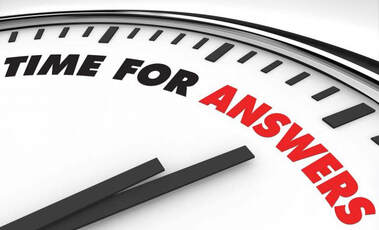 As we hunker down and shelter-in-place, it is fun to bring out the board games, watch old movies, enjoy some snacks, and fill some of the silence with good tunes. Perhaps this quiz will provide fresh ideas for celebrating some of the enduring discoveries of the past decades. Here are the answers to Wednesday’s quiz:
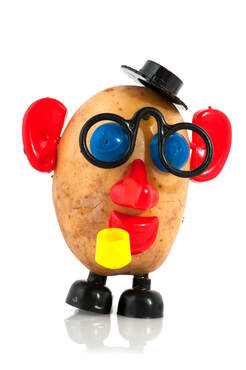 I find myself more sentimental than usual during this quiet time of shelter-in-place. Can you identify the correct decade for these favorite toys, new foods, popular actors, and chart-topping songs:
Have fun! Answers on Friday. |
AuthorLilli-ann Buffin Archives
July 2024
Categories
All
|
 RSS Feed
RSS Feed